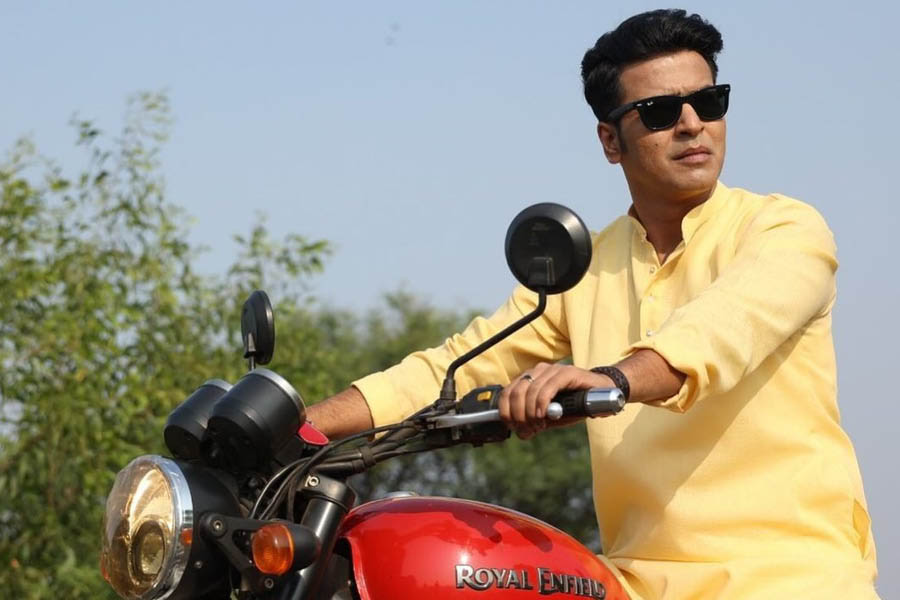The ghost of Mandar hangs over Athhoi. Which is not surprising given that Anirban Bhattacharya is associated with both – as director in the former and creative director in the latter. Which is not such a bad thing either, given what a breakthrough Mandar was in terms of storytelling, adaptation, setting, its visual language, as well as the spoken language it chose to give the Bard’s Macbeth a unique local flavour. An adaptation of Macbeth that stood up to and often bettered Vishal Bhardwaj’s Maqbool.
Atthoi, directed by Arna Mukhopadhyay, gets a few of the Mandar touches right. The visual language is exemplary (both in the way Soumik Haldar shoots the film and in the film’s production design), the way the sets and colour schemes convey the mood. What also works for the film is its setting in a village that lacks primary amenities and which gives the script the leeway to comment on the caste system that operates in our interiors. In a nation where caste configurations play such an important role even in the selection of our political representatives, where the lower castes are still humiliated and hounded in even satellite towns, not to speak of the hinterlands, it is both interesting and dynamic to frame the central conflict in terms of caste.
Athhoi Lodha (director Arna Mukhopadhyay reprising Othello) is a doctor in Vinsura, a village in the interiors of Bengal, whose ancestors have suffered the humiliation of being born to the lowest of castes (his grandmother was burnt at the stake, in what is one of his enduring nightmares). He grows up thanks to the munificence of an enlightened upper-caste landlord who also happens to be the father of Anagra Chatterjee aka Gogo (Anirban Bhattacharya as Iago, in probably his most showy performance to date), Athhoi’s best friend. The dynamics between the two make for an interesting study.
They have been the closest of friends since childhood. Athhoi makes do with Gogo’s leftovers – both food and clothes – all through their growing-up years. Both become doctors, and while Athhoi devotes himself to the cause of his village, Gogo goes off to the US for cancer research. Despite his privileged circumstances, Gogo always ends up second best to Athhoi in every aspect of life, from academics to love, with Diya (Sohini Sarkar, an ineffectual Desdemona) choosing Athhoi, and giving up her privileged life to follow him to the back of beyond. Despite being the closest of friends, Gogo is not beyond mocking Athhoi for his low-born status and it’s almost as if he expects servility from his friend, and gratitude for Gogo treating him as a friend.
The film gets off to an intriguing start as Gogo, having returned to Vinsura to, in his own words, ‘play a game’ (Anirban Bhattacharya breaking the fourth wall to address the audience and insist that the camera come closer or go back), visits all the old haunts of his childhood, with snappy flashbacks giving us the backstory. However, it does not take long for the film to go off-track. The breaking of the fourth wall, the repeated reference to ‘the game’ (with Anirban feigning cricket shots time and again) soon begin to pall as the film seems to get obsessed with Anirban the star rather than Gogo the character.
The sectionalising of the film into cricket parlance – middle overs, slog overs, etc — and the characters explaining the significance of each also becomes too expository. Too much exposition soon becomes the bane of the film, and towards the end when the two friends ride off into the fields to remonstrate, rail and rant, and you have yet another of the flashbacks to their adolescence to explain their equation, you have had enough.
Iago is one of the most fascinating characters of literature ever created and such is the nature of the character that you really do not need to do much with it. Here, Anirban – probably the best actor we have in the Bengali stage-and-screen industry today – falters. I do not have an issue with the film’s theatrical approach (given that its genesis lies in Arna and Anirban’s popular stage production) and its often melodramatic aesthetic. What’s problematic is the one-note tone of the film and of Anirban’s portrayal. It is one thing to give the character an edgy, almost psychopathic, trait, which makes it an interesting Iago. It is quite another to have nothing by way of a variation in the performance. So overbearing is his presence that everything else is put to the shade – including Athhoi.
Yes, Othello as a play is primarily a showcase of Iago’s machinations but Athhoi the film makes the cardinal error of making it Anirban’s show (and showy) reel. Anirban had a ‘showy’ character in Mandar too, as he did in his outings in Srijit Mukherji’s copverse films, but the restraint in some of those worked admirably. I have not seen the Arno-Anirban stage play from which Athhoi originated, so I am not sure how much has changed in the character of Gogo. It’s also in the realms of conjecture whether Anirban as director could have made a difference, whether Arna is so overawed by the starry presence of the film’s big draw – Anirban Bhattacharya – that he becomes blind to the film’s fatal flaws: the tonality, the length and the imbalance in the characters.
In the end, as the ghost of Mandar chokes Athhoi, for those looking for a Bengali adaptation of Othello, there’s Ranjan Ghosh’s Hrid Majhare which stands head and shoulders above, as one of the only two Shakespeare adaptations in Bengali that have worked.
(Shantanu Ray Chaudhuri is a film and music buff, editor, publisher, film critic and writer.)










